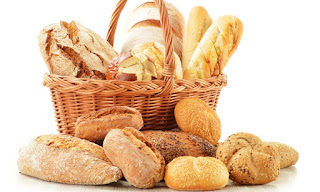Wink wink
But in real life the Victorian diet was obviously quite different.
Your dining experience would depend entirely on your economic standing.
If you tuned into the show on PBS, Victorian Slum House recently, then you already know the plight of the very poor and how they lived. You also will remember how excited they were to have bread, bread and some more bread. If they actually had something to put on their bread it was a red letter day. I'm sure the scenes of people eating so much bread was a lot like a scene out of the Exorcist for some of our gluten free friends out there.
Now the middle class were much better off. They had actual food.
Mutton, well-cooked vegetables, potatoes, eggs, bacon, ham.
No salads though, in fact, no raw foods at all. As they did not think it was healthy for the digestion. And nobody knew anything about vitamins, that's waaaaay later.
And apparently no one drank any water, because it was feared to be unsafe and impure. The preferred drinks were beer and ale, then later in the century coffee and tea.
Me in Victorian London...so thirsty!
Sweets of course were popular with all the classes. Unfortunately though, at the time, many pastry shops were trying to achieve fanciful colors and used heavy metals for color.
To get gold and silver colors, zinc and copper were added. For blues iron was added, and lead for red. Occasionally arsenic was used to achieve the color green.
I guess that's where we get the term " I'm dying for something sweet." No...bad pun? Ok moving on.
Victorian Candy Store
Wealthy people had infinite choices and dined in a more seasonal fashion. They had access to a variety of fresh foods such as...fish, shellfish,wild game,wild and domestic fowl. Seasonal fruits, vegetables and imported luxury spices. Think Downton Abbey.

Where's the Beef?
A lot has changed since the days of the Victorians. Whether for better or worse, I guess we'll never know...










Hilarious! I loved it :) Can't wait for the next blog post. XO
ReplyDelete